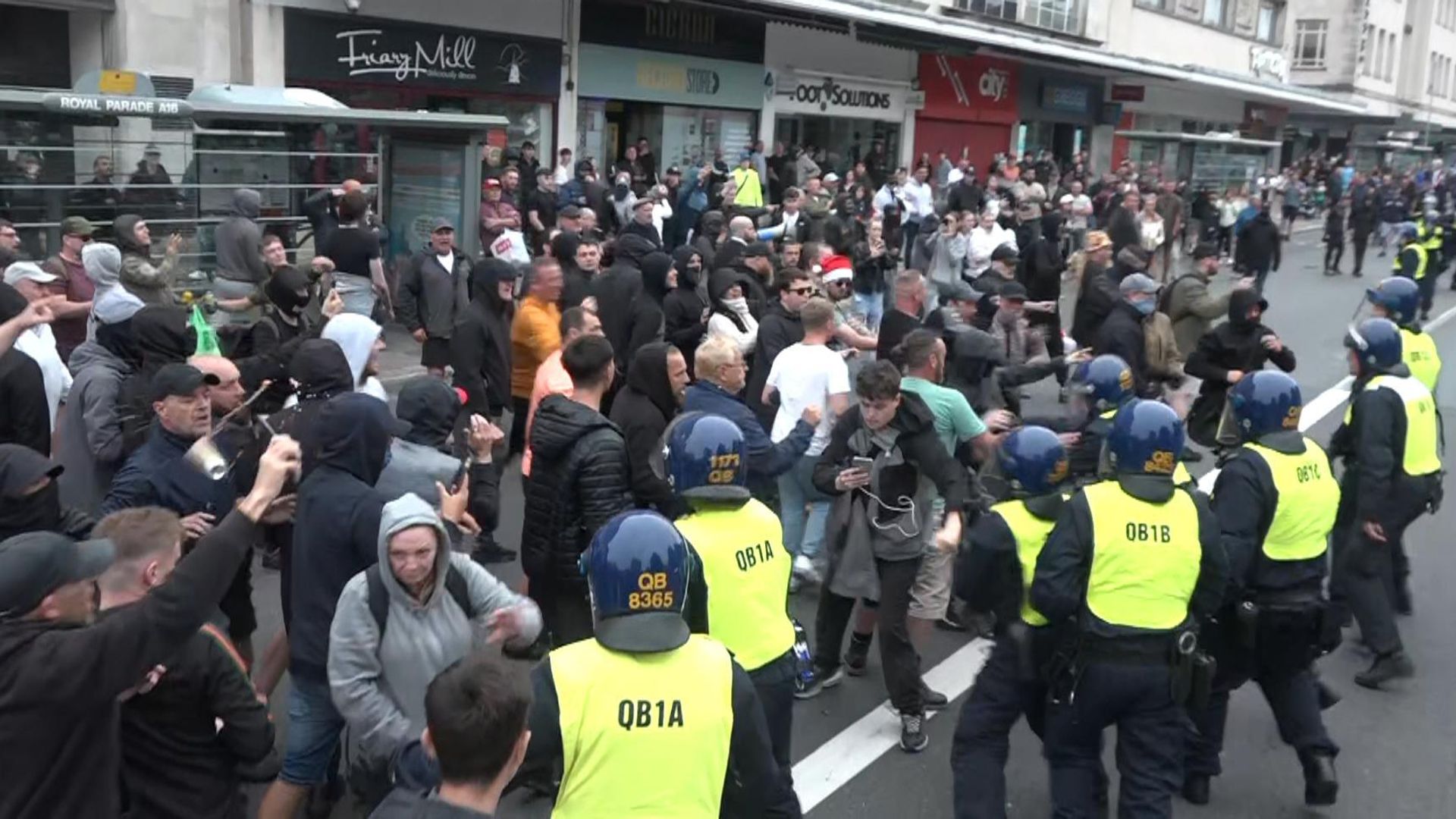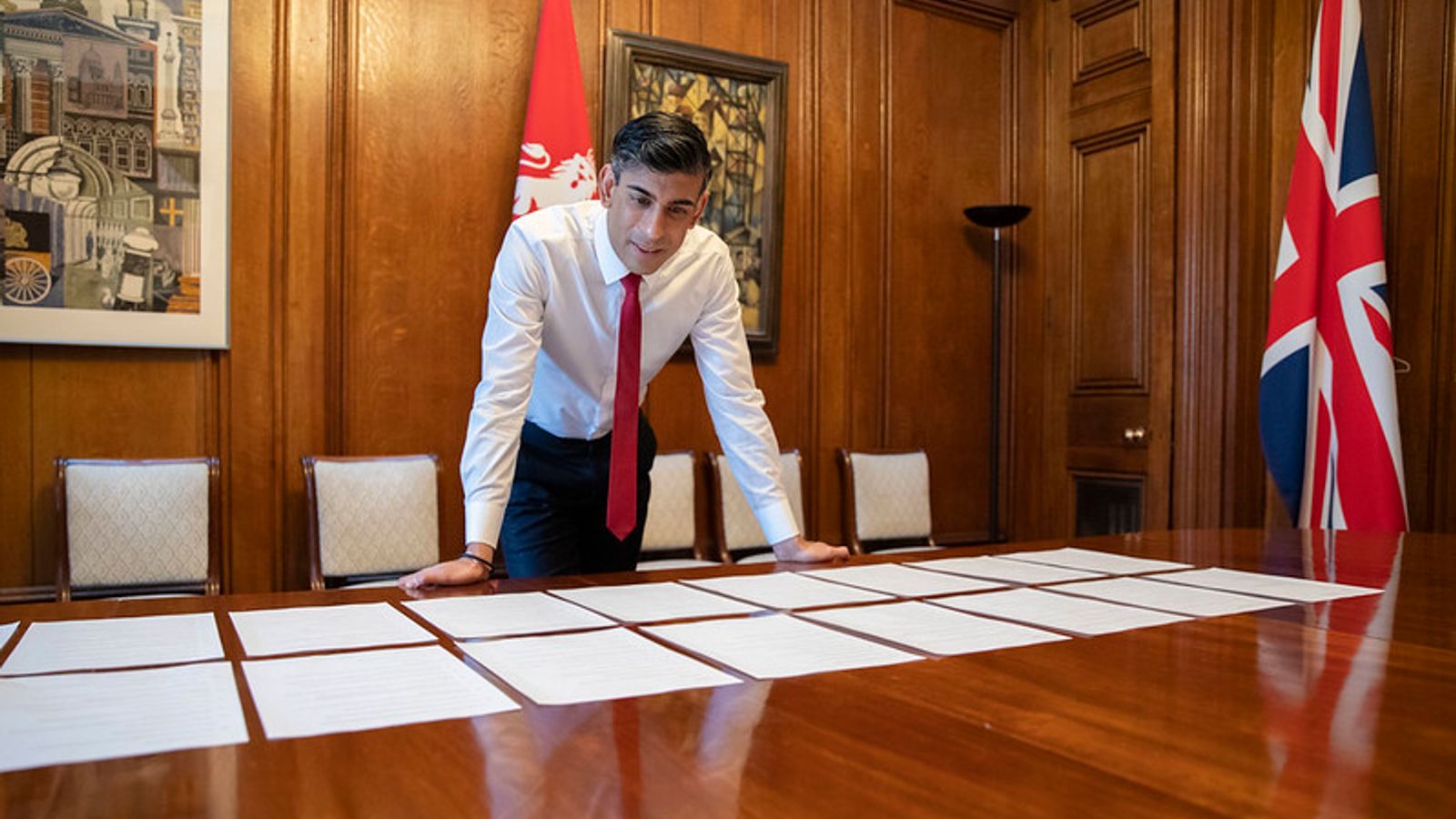Thousands of police officers are braced for potential violence this evening as far-right gatherings over immigration continue across the country.
There are more than 100 events being monitored by police forces across the country, with many groups thought to be targeting immigration law specialists, Sky News understands.
Mosques are also on high alert having been widely targeted in the riots that have plagued the UK for a week.
Residents in towns and cities where violence is anticipated have told Sky News they are feeling frightened and vulnerable.
Fears of new rioting ‘flare up’
Sky News’ communities correspondent Becky Johnson has been speaking to residents in some of the areas where discord is anticipated tonight.
“Should I go out or stay in? Are my children safe? Who can I trust?
“These are all questions being asked in communities around the country,” Johnson reports.
She adds: “There are many thousands of people who don’t feel they can live their lives as normal, with fear of violence forcing changes to plans. Daily routines are being assessed for risk.
“For many people who are not white, Britain feels more hostile. Promises by police of extra security for places like mosques are met with fear that it still won’t be enough.
“Some communities are beginning to take the protection of their streets into their own hands. That in turn leads to increased fear of violent confrontations.”
Sky News understands 30 counter-protests are also expected to take place.
“There are more questions too,” Johnson continues. “When will this end? And how long will it take to rebuild cohesion that was already fragile in many of the communities affected?”
Please use Chrome browser for a more accessible video player
Immigration law firms ‘very scared’ by reported plans
A list of immigration law solicitors’ firms and advice agencies was shared in chat groups as possible targets for gatherings, with the message inviting people to “mask up” if they attend.
That has put staff at some of those businesses on high alert, with some saying they have been advised to work from home today.
One immigration lawyer tells Sky News: “It’s a really frightening time for many vulnerable asylum seekers and also immigration firms.”
She has taken the decision to keep some staff at home so only essential staff have to go into the office in the centre of the northern town where she works.
“It’s making many people frightened… there are other groups wanting to coordinate feeling they want to protect their assets,” she says. “I’m really worried it will flare up.”
An office manager at an immigration advisory service says he feels “very, very scared and very upset” regarding the threats his workplace has received and that surrounding businesses feel the same.
A woman who works at an immigration services provider says they have been entering and leaving the office at the same time as colleagues so no one is alone in the building, adding: “You don’t really know what can happen – you get a bit paranoid then, like anytime someone comes or someone buzzes, like ‘Oh my god, is something going to happen?'”
Some companies say they have removed their addresses from their websites as a precaution.
Shops urged to close early; Muslim women advised not to go out
General businesses are also concerned about the protests, as many shops have been urged to close early in areas where far-right gatherings are planned following vandalism, arson and looting in parts of the country.
The Association Of Convenience Stores, which represents around 50,000 small retailers in the UK, says it has been advising its members to “err on the side of caution” following riots in recent days.
Trade body the British Retail Consortium held emergency talks on the riots earlier today.
Police and government representatives also attended the meeting, which mainly focused on safety measures.
Further talks are planned if the riots continue.
Please use Chrome browser for a more accessible video player
In Hull, police are still gathering CCTV from a mosque that was targeted during the riot in the city on Saturday, Becky Johnson reports.
“Burnt-out and smashed-up cars remain on the street behind the mosque, as does the threat of further violence,” she says.
“The mosque now has extra fencing to try to stop missiles getting into the grounds. Worshippers there say one man is still in hospital after being hit in the jaw as objects were pelted at the mosque during the disorder.
“People from the Kurdish community are heeding the advice of police.”
Amanj Jamil, from the mosque, says people “are not feeling 100% safe at all” ahead of more planned protests. He adds they’re being offered advice by the police.
“Women wearing Hijab are under risk, they are more vulnerable,” he says. “The advice to them for the time being until things calm down is try to come out less or don’t come out or try not to go anywhere where crowds of people are gathering.”
What are police and community leaders doing to keep people safe?
Police officers and fire officers have visited some of the offices apparently targeted on the list of planned protests.
Those that have remained open have been told to check their security arrangements, including CCTV cameras and smoke alarms.
Some of them have been offered additional police protection.
Police are also stepping up neighbourhood patrols, while teams of detectives are drawing on CCTV and body-worn footage, as well as making use of retrospective facial recognition, to identify perpetrators of violence.
Intelligence teams are monitoring well-known influencers and organisers for activity.
More riot police have also been put on standby.
Police in regions where protests are being anticipated have put out statements assuring the public that they will be protected by local officers.
Andy Valentine, who is in charge of the Metropolitan Police’s operation against disorder, said on Tuesday: “This country is faced with one of the worst spates of violent disorder in the last decade.
“This is a national critical incident and we will do everything in our power to protect London and its communities.
“We know about the events planned by hateful and divisive groups across the capital. They’ve made their intention to cause disruption and division very clear.
“We will not tolerate this on our streets. We will use every power, tactic and tool available to prevent further scenes of disorder.
“We arrested more than 100 people in central London disorder last week and we will not hesitate to arrest hundreds more if they take to the streets intent on fuelling violence.”
He added: “Our officers put the safety of others above that of their own. They have faced dangerous and violent scenes and verbal abuse in the name of public service and keeping the King’s peace. They will continue to fulfil their duty in the coming days and weeks.
“Londoners in parts of the capital will see more officers in their local area. If anyone is concerned or needs our help, please speak to them. They are there to help.
“Our officers and our communities have truly pulled together in these difficult times. We are proud to stand together against the vile and criminal behaviour we’ve seen in recent weeks.”
Read more:
Three men jailed in first Crown Court sentences after riots
Met Police chief responds to two-tier policing claims
Be the first to get Breaking News
Install the Sky News app for free
Police ‘change approach’ with more than 100 protests planned
Police will also use new measures to bring officers to the scenes of disorder quicker than usual.
Andy Marsh, the chief of the College of Policing, says police have “joined up folks in our intelligence, our tactics, our capability, our response” ahead of more than 100 protests planned on Wednesday evening.
The College of Policing will gather together “gold commanders and strategic leaders” for a knowledge sharing event so they can “think about the tactics” used.
Despite admitting officers won’t know which routes rioters will take, Mr Marsh says changes had been made to ensure there would be no delay in police reaching areas where violence breaks out.
Please use Chrome browser for a more accessible video player
“We’ve changed our approach,” Mr Marsh says.
“We would normally work from something that’s called mutual aid. Where a force can’t cope, they apply for mutual aid, either in advance or spontaneously.
“We know that that’s not quick enough. That’s exactly the reason why we’re moving to this new approach for this series of violence so that we can get the right numbers of officers quickly enough to the right place.”








